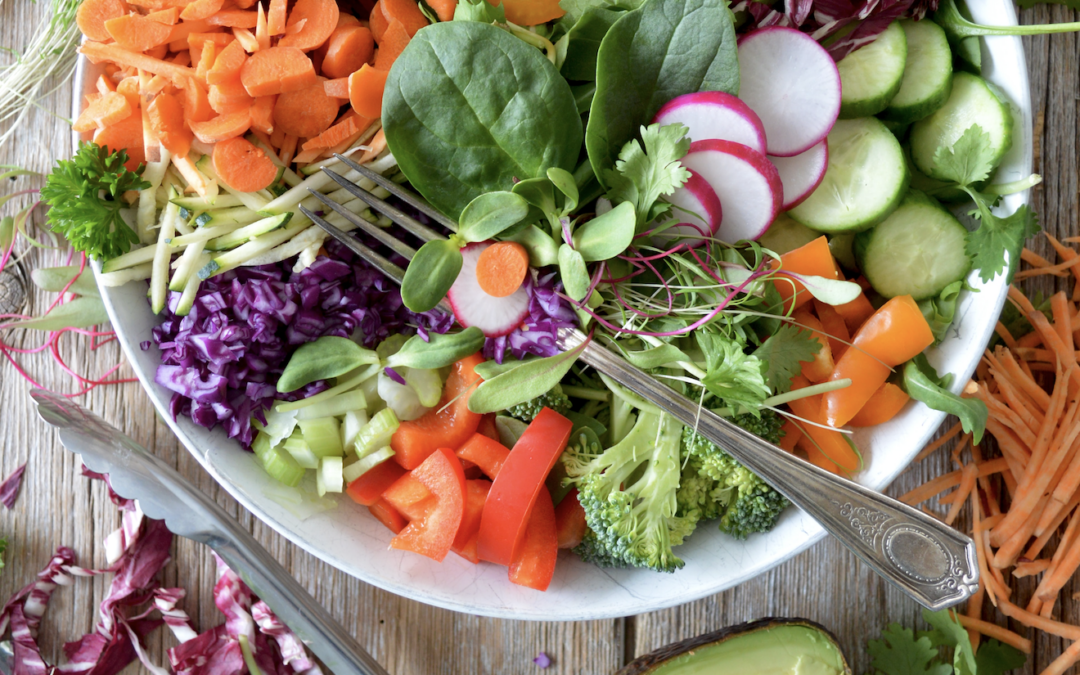Many raw foods are safe and especially good for nourishing the skin. Raw food provides the body with substantial amounts of fiber, minerals, vitamins, and essential fatty acids (EFAs). All of these are important for hydrating the skin, maintaining its underlying structure (collagen and elastin), and supporting the vascular system that brings nutrients to, and carries toxins away from, the skin.
Please note that not everyone’s gastrointestinal (GI) system can handle digesting raw food. If you have certain GI discomfort like gas, bloating, or SIBO to name a few, a raw food diet may not be appropriate for you. Please consult your naturopathic healthcare provider before switching to an all raw food diet and please understand that raw food is a means to healing and is not advised to be a permanent diet.
What is Raw Food?
Although there is some debate, raw foods typically include any food that remains in an unprocessed whole form, which has not been heated 104–118°F (40–48°C) and is not pasteurized. The temperature indication is significant because crucial natural enzymes important for digestion and nutrient absorption can be destroyed above 118°F (47°C) (depending on the food). Additionally, the theory behind consuming raw food is that it provides your body with the optimal nutrient density–very little is lost to processing, packaging, cooking and storage.
Many types of raw foods can be combined to create delicious snacks and meals that are ideal for nourishing your skin, including:
- Nuts & seeds, including raw nut butters
- Fruits & vegetables (e.g., avocado, banana, oranges, berries, kale, spinach, other dark greens)
- Freshly made juices (fruit or vegetable)
- Soaked/sprouted beans, legumes & grains
- Dried fruits & vegetables
- Fermented foods such as Kimchi
- Seaweed
Here are some of the many key nutrients that raw foods provide to the skin:
Antioxidants. At a cellular level, antioxidants help your body process damage and slow down cellular aging. Many dermatologists recommend diets that are rich in the major antioxidants, vitamins, A, C, and E, to keep your skin wrinkle-free. Antioxidants are abundant in fruits, especially citrus fruits, cantaloupe, berries, and veggies such as bell peppers and spinach.
Essential Fatty Acids. The Omega-3 and Omega-6 Fatty Acids are important for keeping your skin smooth. Without fat, vitamins, A, D, E, and K are not readily absorbed; this can create a chain reaction of nutrient insufficiency that affects the skin. EFAs also help reduce inflammation. EFAs are obtained through foods such as avocado, fish, olives and flaxseed.
Fiber. Fiber supports movement in the GI tract, in turn helping your body remove toxins and keeping your skin healthy. People who suffer from skin problems may also be suffering from constipation. This build-up in the gut impacts many systems in the body, and that can show up in distressed skin. Your skin is your largest organ, if other methods of elimination are not sufficient, toxins can be detoxed from your skin.
Your holistic health practitioner can guide you about the best way to integrate raw foods into your current diet, or identify another nutritional approach that is suitable to your health needs.
REFERENCES
- Medical News Today: “Should I try a Raw Food Diet?” (tips on how to start) Accessed 10 August 2021.
- RootWholeBody.com “Glow-Food: jumpstart Skin Repair with Raw Foods.” Accessed 11 August 2021.
- Szyszkowska, B., et al. “The Influence of Selected Ingredients of Dietary Supplements on Skin Condition.” Postȩpy Dermatologii i Alergologii 3 1, no. 3 (June 2014): 174–181.






